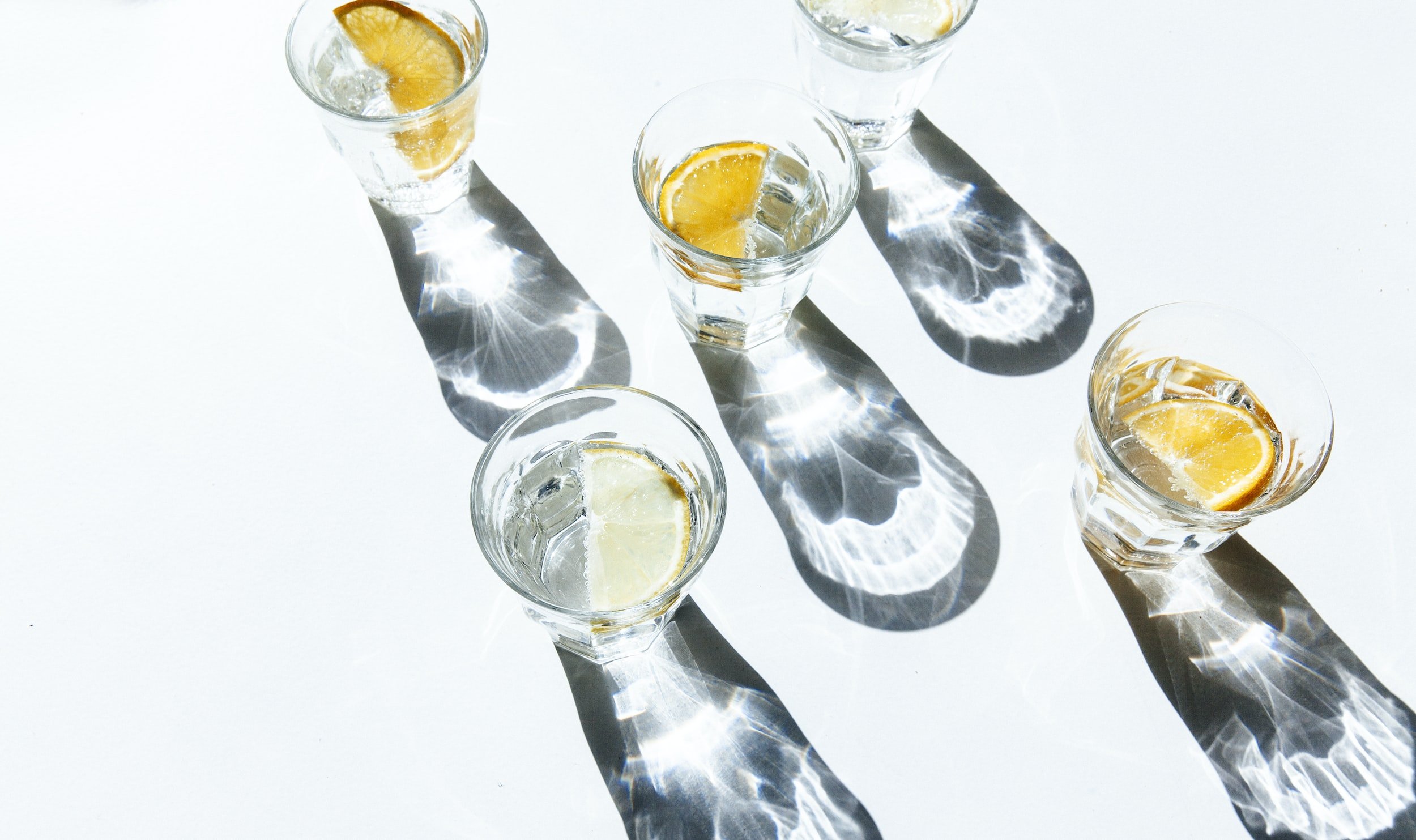Water, Water, Everywhere
How much water do we need to drink?
Eight glasses a day, right? That’s what we’ve always been told. Ask someone why you need to drink this much water every day, and they probably wouldn’t be able to tell you. Concerning bio-individual needs, water intake will vary from person to person, and the 6 to 8 glasses may be a catchy slogan.
To get an idea of how much water you need to drink to maintain your health, let’s dive into one of the five foundations of nutritional therapy – hydration. But first, let’s get some clarity on our drinking glasses.
The original “eight glasses” claim for good health purportedly comes from a 1945 U.S. Food and Nutrition Board recommendation, which stated that we should drink 2.5 liters of water daily for good health. But unfortunately, the recommendation wasn’t based on any actual research, and instead of more concrete directions, this recommendation took hold in our culture. Add in the fact that nutrition science is complicated and poorly understood (even by experts!), and it’s clear why we can’t seem to shake the idea that more water = better health.
How much do you need?
This isn’t to say that hydration isn’t important; it certainly is, especially in hotter regions where people lose more water from sweating and exhalation. There are plenty of clear associations between hydration and metabolism, skin health, and general fitness. Water is essential for life, and humans cannot go very long without it. Unfortunately, we are some of the most water-inefficient beings on the planet, we can’t store it, and we lose quite a bit of water daily. We must replenish our lost reserves by getting correctly hydrated.
As a dancer, athlete, or weekend warrior, depending on your activity level and the environment – it would help to know that you could lose, on average, ten to twelve cups of water daily that needs to be replaced to maintain your body’s crucial fluid balance.
Fast Facts:
Every system of our body needs water every day. Water and fluids perform many functions in the dancer’s body. Some of these functions include:
As a solvent transporting minerals, vitamins, amino acids, glucose, and many other small molecules.
It acts as a lubricant around joints and absorbs shocks to joints and organs.
Improves oxygen delivery to cells
Regulates body temperature
But too much of anything isn’t good. Even water. So, how much is the right amount? The answer is a bit tricky. Three factors influence how much water you should drink:
Bodyweight
Activity level
Local climate
Generally, the more you weigh, the hotter it is, and the more active you are, the more water you’ll need.
Regarding a specific total, some resources suggest taking half your body weight and aiming for that total in ounces; for example, a 200-pound person would need 100 ounces of water each day. However, this is just a rule of thumb—no specific formula works for every person. Too many variables go into the equation, especially when adding water intake from solid foods.
When Dancing
Drink often while dancing or exercising. The American Dietetic Association recommends at least two cups of fluids two hours before exerting, followed by another two cups of water approximately fifteen to twenty minutes after endurance exercises. During exercise, replenish fluids every fifteen to twenty minutes, especially if you are working up a sweat or dancing in a heated environment.
Water intake doesn’t mean drinking
It’s important to note that your daily “water intake” encompasses more than the liquid you drink. For example, nearly every food we eat has water in it, and some (like fruits and vegetables) are extremely water-rich.
In short, you might be more hydrated than you think, even without downing a tall glass of water at every meal. But, of course, this begs the question: How can I tell whether I’m hydrated enough to be healthy?
Follow your body’s signals
Every person’s water needs are unique, and as such, we need to rely on our signals when deciding whether we’re properly hydrated. But, according to the Mayo Clinic, there are a few easy ways to stay hydrated, no matter how much water your body needs:
Drink water or other liquids regularly around your meals but limit intake during eating
Drink any time you feel thirsty (or hungry!)
Sip your water slowly throughout the day instead of chugging it down.
Drink room-temperature water instead of cold water.
If you’re exercising, drink extra before and after a workout.
Here are some tips for how to drink your water to increase absorption:
Drink spring or filtered water re-mineralized with trace minerals or a pinch of high-quality natural salt. If dancing for more than four hours, it’s important to replenish electrolytes. Electrolytes, Sodium, potassium, and chloride are lost through sweat. Athletes taking in a lot of water during their training sessions would be wise to add a pinch of salt and perhaps a bit of carbohydrate to their drinking water; this helps your body absorb fluids and other electrolytes to maintain fluid balance. It will help with your energy and mental focus. I’m not a fan of commercial sports drinks due to artificial flavorings. Reduce waste, and save money by:
I am simply adding various flavorings to plain water. Cucumber slices, watermelon, lemon, or lime wedges are just a few options, and while apple cider vinegar is an acquired taste, a little in your water can be strangely thirst-quenchingly good. I also prefer good quality coconut water diluted in my water bottle. The ratio is 1 part coconut to 3 parts pure filtered water. I will also add a pinch of sea salt and lime into the mixture – tasty good hydration.
Another good example
1 ½-2 cups water
Juice of ½ lemon
1/8 to 1/4 tsp real sea salt Himalayan salt, or Celtic sea salt
2 tsp raw honey local if possible, or THIS is a good brand
It should be easy enough to tell whether you’re hydrated; generally, thirst, fatigue, and overtly yellow urine are signs of dehydration. Aim for a routine of daily water intake that matches the energy you expend. it stand out
.
The perfect amount of water
Unfortunately, no “ideal” recommendation for water intake applies to everyone. Even on an individual level, water needs vary widely across people. So you don’t have to force yourself to chug water each day in hopes of meeting an arbitrary goal. Instead, what is essential is that you listen to your body’s signals and adjust your intake until it matches your lifestyle.
“Water is the cheapest form of medicine for a dehydrated body.”
RESOURCES
https://www.umsystem.edu/totalrewards/wellness/how-to-calculate-how-much-water-you-should-drink/
https://www.webmd.com/diet/features/water-for-weight-loss-diet#1
https://www.nytimes.com/2015/08/25/upshot/no-you-do-not-have-to-drink-8-glasses-of-water-a-day.html
https://www.mcgill.ca/oss/article/health-nutrition/water-myth
https://journals.physiology.org/doi/full/10.1152/ajpregu.00365.2002
https://fivethirtyeight.com/features/you-dont-need-8-glasses-of-water-a-day/



